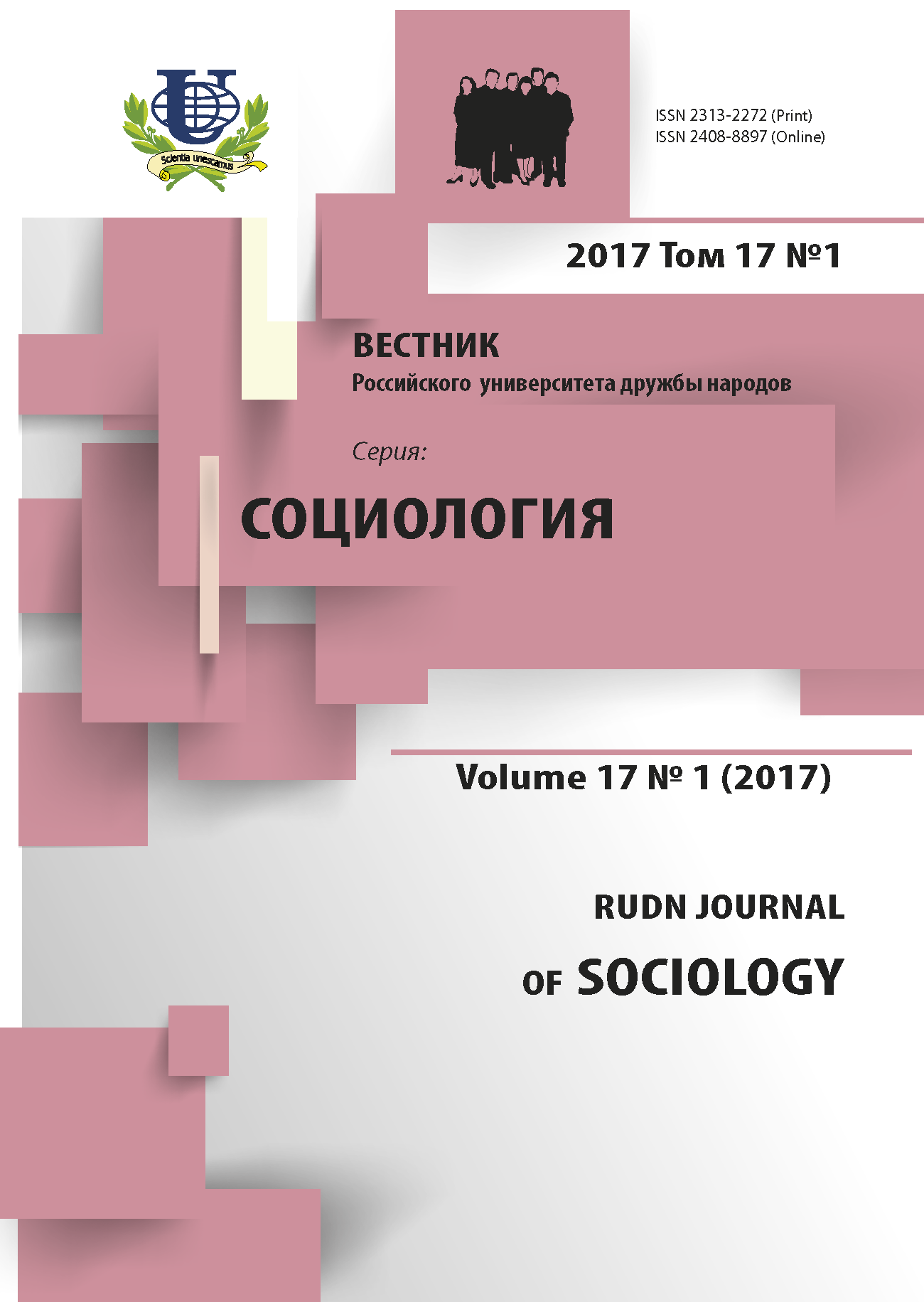Сетевой фронтир как метафора и миф
- Авторы: Плотичкина Н.В.1, Довбыш Е.Г.2
-
Учреждения:
- Кубанский государственный университет
- Национальный исследовательский институт мировой экономики и международных отношений им. Е.М. Примакова РАН
- Выпуск: Том 17, № 1 (2017)
- Страницы: 51-62
- Раздел: Вопросы истории, теории и методологии
- URL: https://journals.rudn.ru/sociology/article/view/15455
- DOI: https://doi.org/10.22363/2313-2272-2017-17-1-51-62
- ID: 15455
Цитировать
Полный текст
Аннотация
В статье рассматриваются пространственные метафоры Интернета, подчеркивается возможность экстраполяции тезиса о фронтире Ф.Дж. Тернера на концепт электронного фронтира. Указывается, что информационно-коммуникационные технологии и цифровой мир стали новыми пространствами для экспансии государств или отдельных граждан. Представлена характеристика научных дискуссий о границах и потенциале применимости метафористических конструкций западного и электронного фронтиров для аналитического описания цифрового пространства. Описана дискуссионность метафористического конструкта Интернета как западного фронтира; для зарубежных исследователей аналогия электронного фронтира является более эвристичной и валидной в ходе конструирования метафор цифровой реальности. Сетевой фронтир интерпретируется как динамичная эластичная проницаемая граница пространства освоения социокультурных практик сетевого общества. Дана оценка эвристического потенциала понятия сетевого фронтира, разработанного на основе интеграции теории фронтира и концепта сетевого общества с учетом эффектов процесса глобализации, для исследования эластичной проницаемой подвижной границы сетевого ландшафта. Показано, что в цифровом мире происходит трансформация пространственности, сетевая география Интернета имеет следствием метаморфозу фронтира. Сетевой фронтир является контактной зоной между онлайн- и оффлайн-пространствами, он динамичен, носит инновационный характер, поощряет мобильности, степень его проницаемости определяется уровнем цифровой компетентности граждан. Авторы рассматривают мифологизацию западного и электронного фронтиров, перечисляют основные мифы сетевого фронтира, коррелирующие с риторикой западного фронтирного мифа. В статье описываются основные составляющие мифа западного фронтира, связанные с идеей американской исключительности. Делается вывод, что в современном сетевом обществе циркулируют мифы о фронтирменах и об осваиваемом ими онлайн-пространстве.
Об авторах
Наталья Викторовна Плотичкина
Кубанский государственный университет
Автор, ответственный за переписку.
Email: oochronos@mail.ru
ул. Ставропольская, 149, Краснодар, 350040, Россия
Евгений Геннадьевич Довбыш
Национальный исследовательский институт мировой экономики и международных отношений им. Е.М. Примакова РАН
Email: edovbysh@gmail.com
ул. Профсоюзная, 23, Москва, 117997, Россия
Список литературы
- Барлоу Дж.П. Декларация независимости киберпространства // URL: http://www.zhurnal.ru/ staff/gorny/translat/deklare.html.
- Барт Р. Избранные работы: Семиотика: Поэтика. М.: Прогресс, 1989.
- Кастельс М. Галактика Интернет: Размышления об Интернете, бизнесе и обществе. Екатеринбург: У-Фактория, 2004.
- Лакофф Дж., Джонсон М. Метафоры, которыми мы живем. М.: Едиториал УРСС, 2004.
- Морозова Е.В., Мирошниченко И.В., Рябченко Н.А. Фронтир сетевого общества // Мировая экономика и международные отношения. 2016. Т. 60. № 2.
- Панарина Д.С. Феномен фронтира в культуре Америки и России (США и Сибирь): Дис. канд. культурологии. М.: МГУ, 2011.
- Baker D.L. The electronic frontier and other cyberspace myths. World & I. 1994. Vol. 9. No. 11.
- Bennett S., Maton K.A., Kervin L. The «digital natives» debate: a critical review of the evidence. British Journal of Educational Technology. 2008. Vol. 39. No. 5.
- Biegel S. Beyond our control? Confronting the Limits of Our Legal System in the Age of Cyberspace. Cambridge: The MIT Press, 2001.
- Carveth R., Metz J. Frederick Jackson Turner and the democratization of the electronic frontier. The American Sociologist. 1996. Vol. 27. No. 1.
- Freishtat R.L., Sandlin J.A. Shaping youth discourse about technology: Technological colonization, manifest destiny, and the frontier myth in Facebook’s public pedagogy. Educational Studies. 2010. Vol. 46.
- Hunter D. Cyberspace as place and the tragedy of the digital anticommons // California Law Review. 2003. Vol. 91. No. 2.
- Jordan T. Cyberpower: The Culture and Politics of Cyberspace and the Internet. L.-N.Y.: Routledge, 1999.
- Marcut M. The Socioeconomic Evolution of the European Union. Exploring the Electronic Frontier. Switzerland: Springer International Publishing, 2016.
- McClure H. The wild, wild web: The mythic American west and the electronic frontier. Western Historical Quarterly. 2000. Vol. 31. No. 4.
- Mitchell W. City of Bits: Space, Place and the Infobahn. Cambridge, Mass.: MIT Press, 1996.
- Mosko V. The Digital Sublime. Myth, Power and Cyberspace. Cambridge, L.: The MIT Press, 2004.
- O’Dowd L. The changing significance of European borders. J. Anderson, L. O’Dowd, T. Wilson (Eds.). New Borders for a Changing Europe - Cross Border Cooperation and Governance. L.: Frank Cass Publishing, 2003.
- Olson K. Cyberspace as place and the limits of metaphor. Convergence. 2005. Vol. 11. No. 1.
- Payal A. The Leisure Commons: A Spatial History of Web 2.0. L.-N.Y.: Routledge, Taylor & Francis Group, 2014.
- Prensky M. Digital natives, digital immigrants. On the Horizon. 2001. Vol. 9. No. 5.
- Rumford C. Theorizing borders. European Journal of Social Theory. 2006. Vol. 9. No. 2.
- Rusch J.J. Cyberspace and the “Devil’s Hatband”. Seattle University Law Review. 2000. Vol. 24.
- Stefik M. Internet Dreams: Archetypes, Myths and Metaphors. Cambridge: MIT Press, 1997.
- Stuckey M.E. The Donner party and the rhetoric of westward expansion. Rhetoric and Public Affairs. 2011. Vol. 14. No. 2.
- Turner F. Cyberspace as the New Frontier?: Mapping the Shifting Boundaries of the Network Society. URL: http://fredturner.stanford.edu/wp-content/uploads/turner-cyber space-as-the-new-frontier.pdf.
- Yen A.C. Western frontier or feudal society?: Metaphors and perceptions of cyberspace. Berkeley Technology Law Journal. 2002. Vol. 17.
Дополнительные файлы













